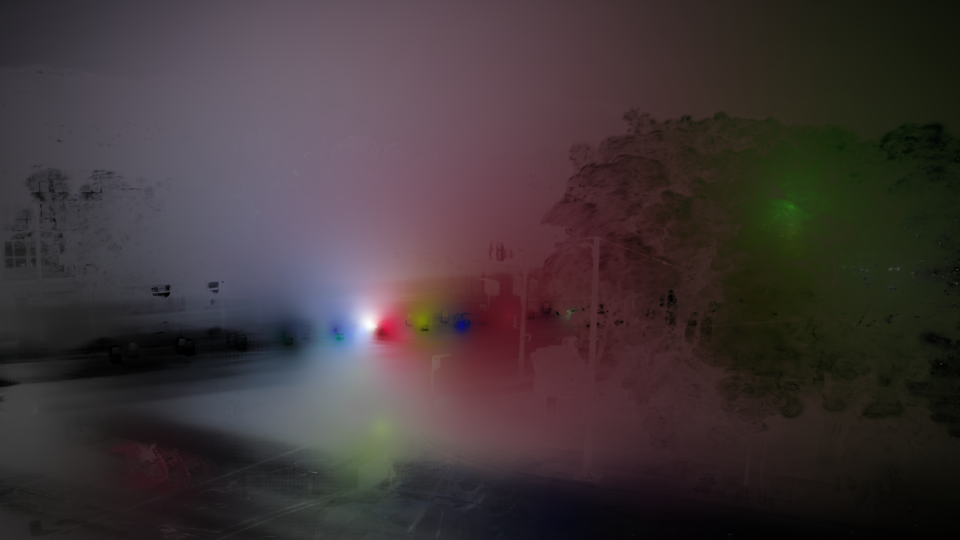Ben Bogart’s new work, A diffraction of past/stability and present/dynamism, was featured on the Mount Pleasant Community Art Screen from December 17th—26th, 2021. This complex long-form work will be presented as an installation in our gallery from January 13th—22nd, 2022, preceded by an online artist talk on January 11th. It will also once again be available to view on the MPCAS throughout the open studio dates. If you would like to book an appointment to view this work in the gallery, please contact communications@grunt.ca
Online artist talk: January 11th, 7:30pm PST.
This event will take place on Zoom, with auto-captions by otter.ai. We will have an external chat available in Discord, however the chat function in Zoom will also be on.
Click here for exhibition map and accessibility notes (OCR compatible).
A diffraction of past/stability and present/dynamism
By Ben Bogart
On the wet dark dreary days, do we relish in the greens and the smell of rain, or do we retreat into imagined days of warmer pasts? The built and natural worlds around us are constantly evolving and transforming. While attending to the changes from moment to moment can we see the boundary between this moment and our past or future? Are we even in the present, or are we immersed in our predictions and simulations, always using samples of the present to validate imagined pasts and futures? These are some of the questions that are asked through this work. “A diffraction of past/stability and present/dynamism” is a study of time and movement at the MPCAS. Source footage was shot from the MPCAS during the long days of summer capturing the dynamism and colour of the site. The footage archives a window in time, documenting the movement of plants, clouds and animate life as humans and non-humans go along with our routines.
The structure of the work is determined by an analysis of human / non-human and natural / artificial movements, resulting in a continuum of dynamism to stillness. Areas of stillness diffuse into soft gradients of colour that undulate over time; these gradients are demarcated by the strong edges and readability of areas of stillness. Augmenting this structure are the discontinuities of the present moment that interrupt the smoothness and consistency of the composition. Through this trace of the present the viewer may pick out the shape of cars and people moving through the frame, but this subtlety is overwhelmed by drastic changes in colour. The cloud-like fields that advance and retreat from frame to frame are determined by colour values of the present where the source is almost entirely veiled in abstraction. A taxi-cab entering the frame does not appear yellow, and yet washes the image in yellow. A cloud blowing over is barely noticeable, but saturates the image in teal. Through these waves of colour and luminosity the viewer may realize this bright summer ‘present’ is in fact another moment of the past; a sample of the summer collected by a machine and reconstructed as an imagined past and present.
Ben Bogart is a non-binary agender adisciplinary artist working for two decades with generative computational processes (including physical modelling, chaotic equations, feedback systems, evolutionary algorithms, computer vision and machine learning) and has been inspired by knowledge in the natural sciences (quantum physics and cognitive neuroscience) in the service of an epistemological inquiry. Ben has produced processes, artifacts, texts, images and performances that have been presented at galleries, art festivals and academic conferences in Canada, the United States of America, the United Kingdom, the United Arab Emirates, Australia, Turkey, Finland, Germany, Ireland, Brazil, Hong Kong, Norway and Spain. Notable exhibitions include solo shows at the Canadian Embassy at Transmediale in 2017 and the TechLab at the Surrey Art Gallery in 2018. They have been an artist in residence at the Banff Centre (Canada), the New Forms Festival (Canada) and at Videotage (Hong Kong). Their research and practice have been funded by the Social Science and Humanities Research Council of Canada, the British Columbia Arts Council and the Canada Council for the Arts.
Click here to read our mini interview with Ben!
And click here to review our COVID-19 gallery protocols.
